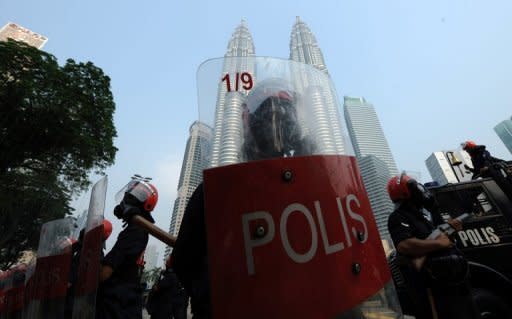Malaysia to scrap tough security law
Malaysia will scrap a tough 51-year-old law allowing detention without trial and ease other legislation long blamed for curbing civil liberties, Prime Minister Najib Razak announced on Thursday. Bowing to a key opposition demand as speculation over snap polls mounts, Najib said the abolition of the Internal Security Act (ISA) and other changes were aimed at striking a balance between security and democratic rights. Opponents of the draconian laws gave a cautious welcome to the landmark announcement but called on the government not to undermine the move with new legislation that Najib said would be drawn up. "I am happy to announce on this historic night that the ISA will be completely repealed," Najib said in a nationally televised speech. "The changes are aimed at having a modern, mature and functioning democracy which will continue to preserve public order, ensure greater civil liberty and maintain racial harmony." Najib took office in 2009 promising changes to the ISA, but Thursday's announcement came as a surprise as government officials had recently indicated the act was slated only for a thorough revision. But Najib, who heads the ruling ethnic-Malay dominated coalition that has governed the country since its independence from Britain in 1957, said two new laws would be drafted. He said these would ensure that multicultural, Muslim-majority Malaysia could "deal with subversive elements, terrorists and criminal acts." The ISA has been a hot-button issue in Malaysia for decades because of its frequent use against critics of the long-ruling government of Najib's party, the United Malays National Organisation (UMNO). Opposition parties and activists say it is routinely abused to silence dissent. Pressure for more political breathing space has grown amid soaring Malaysian use of the Internet and social media. This has been further fuelled by the recent success of the political opposition, which jolted the government in 2008 when -- led by former deputy premier and past ISA detainee Anwar Ibrahim -- it made historic parliamentary gains. Najib is due to call new polls by March 2013. He said new legislation to replace the ISA would ensure detentions could only be carried out by court order and future periods of detention without trial would be shorter than in the past. But he said actions against suspected terrorists would still come under the power of the home minister. Leading opposition lawmaker Lim Guan Eng, who has been previously detained under the ISA, said it was too early to to start celebrating. "We are not popping the champagne as yet because even though we welcome the repeal of the ISA, we want to be assured that the two new laws will not be a case of old wine in new bottles," he told AFP. "The opposition has demanded the removal of the ISA and I think Najib had no choice but to give in to the demands of the people." Najib has faced mounting questions recently -- and declining opinion poll numbers -- over the government's quashing of a July rally for reforms to an electoral system seen as biased toward his ruling Barisan Nasional coalition. There also has been rising anxiety over racial tensions in the country and an increasingly cloudy economic outlook. Najib, who had been expected to make some sort of bold move to jump-start his electoral hopes, said he also would review other laws "that are no longer relevant." This will include repealing the Publications and Printing Presses Act and replacing it with new legislation. The current act leaves the press vulnerable to licence revocation, and has resulted in a print and broadcast media landscape lacking real opposition voices, although several plucky online news portals have stepped into the void. The government will also review an act which requires police permission to stage public gatherings, which has been blamed for stifling freedom of assembly. The ISA allows an individual to be held virtually indefinitely for acts considered a threat to national security or to prevent such acts. Thousands of people have been detained under the ISA over the past five decades, typically those suspected of Islamic militancy and government critics. Nalini Elumalai, an activist with the Abolish ISA Movement, welcomed the move but said any new laws should be free of preventive detention.




